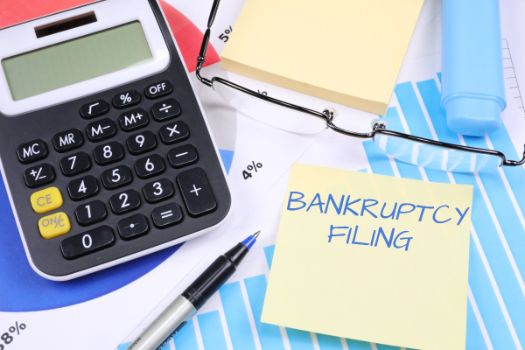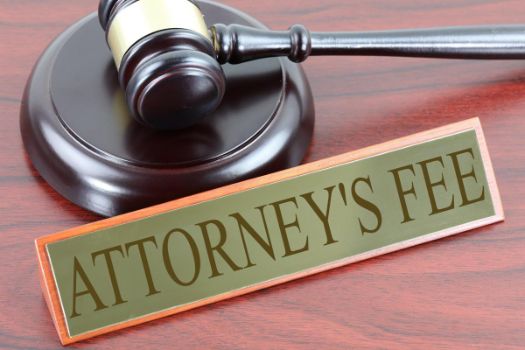The cost of filing for bankruptcy can vary depending on your location, the complexity of your case, and whether you are filing for Chapter 7 or Chapter 13 bankruptcy. Here are some general guidelines on the costs associated with filing for bankruptcy in the United States.

Immediate Costs of Bankruptcy
Court filing fees
- Chapter 7: The filing fee is $338 (fees is subject to change).
- Chapter 13: The filing fee is $313 (fees is subject to change).
Sometimes, you may be eligible to apply for a fee waiver or pay the filing fee in installments if you cannot afford to pay it all at once.
Credit counseling and debtor education courses
Before filing for bankruptcy and before your debts can be discharged, you must complete a credit counseling course and a debtor education course. Depending on the provider, these courses typically cost around $50 to $100 each.
Attorney fees
Hiring an attorney to help you navigate the bankruptcy process can benefit but also add to the overall cost. Attorney fees can vary widely, depending on the complexity of your case and the region you live in. For a Chapter 7 bankruptcy, attorney fees can range from $500 to $3,500, while Chapter 13 attorney fees can range from $2,500 to $6,000. It’s important to shop around and find an attorney experienced in bankruptcy law who offers a fee structure that works for your budget.

Miscellaneous costs
Additional costs may be associated with filing for bankruptcy, such as document preparation fees, postage, or photocopying charges. These expenses can vary depending on the specific requirements of your case.
Average Total Cost: The overall cost to file a bankruptcy can range from $400 to $4,000. You can reduce this fee by representing yourself but hiring a lawyer increases the success chances.
Long-Term Costs of Bankruptcy
Impact on credit score
Bankruptcy will have a substantial negative impact on your credit score. A Chapter 7 bankruptcy remains on your credit report for ten years, while a Chapter 13 bankruptcy stays for seven years. This can make it more difficult for you to obtain credit, such as loans or credit cards, and may result in higher interest rates when you qualify.
Difficulty securing loans or credit
As mentioned earlier, having a bankruptcy on your credit report can make securing loans or credit lines challenging. Lenders may view you as a higher risk, which could lead to loan denials, higher interest rates, or less favorable loan terms.
Impact on job prospects
Some employers conduct credit checks as part of their hiring process, and a bankruptcy on your credit report could negatively affect your job prospects. This is particularly true for positions in finance, management, or roles that require handling money or sensitive financial information.
Difficulty renting a home
Landlords often conduct credit checks on prospective tenants, and a bankruptcy on your credit report may make it harder for you to rent a home. You may be required to provide a larger security deposit or have a co-signer with good credit to secure a rental.
Higher insurance premiums
Insurance companies sometimes consider credit history when determining premiums, and bankruptcy may lead to higher insurance rates for auto, home, or renter’s insurance.
Inability to obtain certain professional licenses
In some cases, bankruptcy can affect your ability to obtain or maintain professional licenses, such as in law, finance, or real estate.
Emotional and social costs
Bankruptcy can also take a toll on your mental health and relationships. The process can be stressful and may cause feelings of shame, embarrassment, or guilt. It can also strain relationships with family and friends, especially if they are involved in your financial situation or co-signed on loans.
How to Pay for Bankruptcy? Different Ways to Reduce Costs
Fee waivers and installment payments
If you cannot afford the court filing fees, you may qualify for a fee waiver or the option to pay the fees in installments. You will need to submit an application to the court demonstrating your financial hardship.
Pro bono legal assistance
Some bankruptcy attorneys provide free or low-cost legal services to clients who cannot afford to pay for representation. Contact your local legal aid office, bar association, or bankruptcy court to inquire about pro bono bankruptcy services in your area.
Self-representation
While working with an attorney for bankruptcy cases is generally recommended, it is possible to represent yourself, known as filing “pro se.” However, remember that bankruptcy law is complex, and mistakes can have serious consequences. Consider this option if your case is relatively simple and you’re confident in navigating the process.
Credit counseling agencies
Nonprofit credit counseling agencies may offer free or low-cost bankruptcy counseling and assistance, including help with filing paperwork and understanding the bankruptcy process. Ensure to work with an agency approved by the United States Trustee Program.
Shop around for attorneys
If you hire an attorney, compare fees and services from multiple lawyers in your area. Some attorneys may offer flexible payment plans or reduced fees based on your financial situation.
Limit additional expenses
Reduce any unnecessary expenses related to your bankruptcy, such as photocopying, postage, or document preparation fees. For example, you can print and prepare documents at home, use electronic communication when possible, and avoid overnight or expedited shipping.
DIY credit counseling and debtor education courses
Find affordable online courses for the mandatory credit counseling and debtor education requirements. Some providers may offer discounts or sliding scale fees based on your income.
Chapter 7 vs. Chapter 13 Bankruptcy
Chapter 7 Bankruptcy
- Liquidation: Non-exempt assets are sold to pay off creditors.
- Quick process: Typically takes 4-6 months to complete.
- Means test: Must pass a means test to qualify, based on income and expenses.
- No repayment plan: Debts are discharged without a repayment plan.
- Keep exempt assets: You retain exempt assets under state or federal law.
- Limited debt relief: Some debts, like student loans and certain taxes, are not dischargeable.
- Credit report: Remains on your credit report for ten years.
Chapter 13 Bankruptcy
- Debt reorganization: A repayment plan is created to pay off debts over 3-5 years.
- Longer process: Takes 3-5 years to complete, based on the length of the repayment plan.
- No means test: No means test required, but you must have a regular income to qualify.
- Repayment plan: Debts are restructured into a manageable payment plan.
- Keep assets: You can keep exempt and non-exempt assets during repayment.
- Broader debt relief: May include debts not dischargeable under Chapter 7, such as certain tax debts.
- Credit report: Remains on your credit report for seven years.
Frequently Asked Questions
Can you represent yourself in a bankruptcy case?
Yes, you can represent yourself in a bankruptcy case, known as filing “pro se.” However, it’s generally not recommended due to the complexity of bankruptcy law. Mistakes can have serious consequences, so it’s advisable to seek the help of an experienced bankruptcy attorney, especially for complicated cases.
Can I pay the court filing fee in installments?
Yes, you can request to pay the court filing fee in installments. You must submit an application to the court detailing your financial situation and proposed installment plan. If approved, the court will schedule you to make the payments.
Can I get a fee waiver?
You might be eligible for a fee waiver if you cannot afford the court filing fees. You must submit a separate application to the court demonstrating your financial hardship to apply for a waiver. If granted, the fee waiver will eliminate the need to pay the filing fees for your bankruptcy case.
What is the fee for filing Chapter 11 bankruptcy?
- Filing and Administrative fee: $1,738
- Attorney fee: $16,000 to $20,000